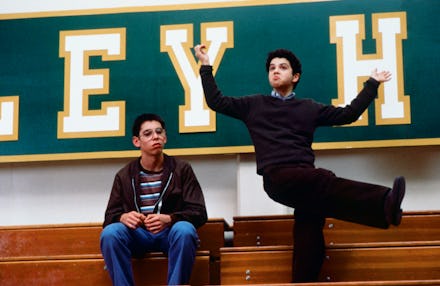What Really Ties You and Your BFF Together? Being Fabulously, Socially Awkward

Best friends share a lot of things: clothes, drinks, secrets, even too-close-for-comfort bathroom trips.
It turns out our close friends likely share our level of social anxiety, too. A new study confirms what many of us have always suspected: We connect most with people who navigate the world in the same awkward way we do.
The awkward flock: Nobody gets our brand of anxieties quite like our anxious friends. In a new study published in the journal Personal Relationships, researchers from Providence College looked at 56 same-sex pairs of undergrads who had only been friends for about a month (ah, the excitement of the first semester) and tracked their relationships as they unfolded over the next few weeks.
Each participant filled out a questionnaire aimed at assessing their social anxiety and another one to measure how close they felt to their new bud. Six weeks later, the researchers checked in to see how the friendship had blossomed or flopped.
The result? Friends who shared the same level of social anxiety, whether high or low, felt closer to their friends than those with mismatched anxiety levels, and also felt a lot less uncertainty about where their friendship stood. Essentially, "new friends become better friends over time if they have similar levels of social phobia," reported Melissa Dahl in Science of Us.
The perks of being a wallflower: Befriending people with the same weird social anxieties means cutting out awkward explanations for, say, why you don't want to walk near the neighborhood you ex lives in, or why you can't bear the thought of putting on pants to go to that party.
As noted by Science of Us, the new findings are in line with a 2005 study, which discovered that when two highly anxious people disclose personal information to one another, they feel closer than those who breeze through personal interactions like it's no big deal. The same wasn't true for when socially anxious people attempted small talk.
It may be the act of opening up about our social anxieties, letting all of our awkwardness hang out, that really solidifies a friendship. Just like the famed "36 Questions" experiment illustrated, self-disclosure creates vulnerability, which in turn creates the space for establishing intimacy.
"Emotional bonds often get stronger when people feel vulnerable," Scientific American's Robert Epstein reported. "When you see someone who is in a weak and vulnerable state, you often feel like comforting or protecting that person; those tendencies make you feel close to someone."
That may extend in particular to those whose anxieties over socializing set them outside the norm.
"I have some token 'cool' friends, but I'm generally more comfortable with other awkward people," Gwendolyn Kansen wrote in a personal essay. "Clearly they're also more comfortable with me. ... The blanket rejection of awkward people comes from people who rank each other based on the dictums of mainstream society. People outside the box don't have to worry about how you fit into it."
So, take a breather: The social butterflies may have plenty of life advantages, but at least the awkward social outcasts have one major upside: We make the best friends for each other. If cult TV shows like Freaks and Geeks and It's Always Sunny in Philadelphia taught us one thing, it's that there's a social niche for anyone, even the "outsiders."
h/t Science of Us